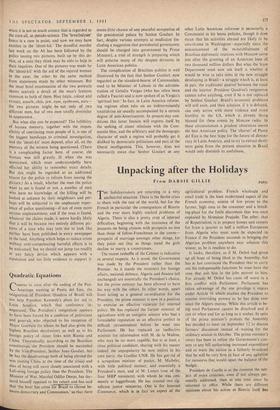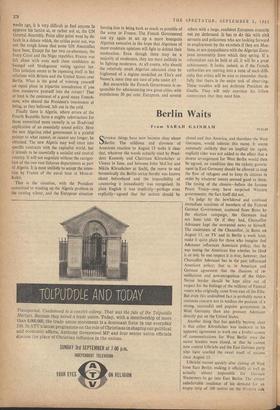Unpacking after the Holidays
From DARSIE GILLIE
PARIS
THE holidaymakers are returning to a very uncheerful situation. There is the Berlin crisis to share with the rest of the world, but for the French in particular the consequences of Bizerta and the ever more highly stacked problems of Algeria. There is also a pretty crop of internal difficulties, beginning with the insistence of the peasants on being citizens with prospects no less than those of fellow-Frenchmen in the towns— prospects of marriage amongst other things, for they point out that as things stand the girls decline to marry a countryman.
The recent reshuffle of the Cabinet is indicative in several respects. As it stood, the Government was made by the President rather than the Premier. As it stands the ministers for foreign affairs, national defence, Algeria and finance (all unchanged) are essentially the President's choice, but the prime minister has been allowed to have his way with the others. In other words, apart from acting as a general co-ordinator for the President, the prime minister is now in a position to exercise an effective vizierate- for internal policy. He has replaced the former minister of agriculture with an energetic senator who had a formidable reputation as an effective prefect in difficult circumstances before he went into Parliament. He has replaced an ineffective minister for information with M. de la Malone, who may be no more capable, but is at least a close political confidant, sharing with his master indeed the unpopularity he now enjoys in his own party, the Gaullist UNR. He has got rid of a scrupulous minister of justice, M. Michelet, with little political instinct, and essentially a President's man, and of M. Leourt (one of the four MRP ministers), with whom he was con- stantly at loggerheads. He has created two sig- nificant junior ministries. One is for Internal Commerce, which is in fact an aspect of the agricultural problem. French wholesale and retail trade is the least modernised aspect of the French economy, source of low prices to the farmer, high ones to the consumer and a breed- ing-place for the futile discontent that was once exploited by Monsieur Poujade. The other, that of Repatriation, is to prepare homes and careers for from a quarter to half a million Europeans from Algeria who must soon be expected in France if the President succeeds in bringing the Algerian problem anywhere near solution this winter, as he is resolute to do.
It looks, therefore, as if M. Debra had given up all hope of being liked in the Assembly, but has at last convinced the President that to carry out his indispensable functions he must have the men that suit him in the jobs nearest to him. For already M. Debra has come off worst in a first conflict with Parliament. Parliament has taken advantage of the one privilege it enjoys under Article 16 which enables the President to assume overriding powers as he has One ever since the Algiers mutiny. While this article is be- ing used Parliament cannot be dissolved and it can sit when and for as long as it wishes. In spite of the prime minister's protests the Assembly has decided to meet on September 12 to discuss farmers' discontent instead of waiting for the ordinary session in October. The prime minister's retort has been to refuse the Government's con- sent to any bill authorising increased expenditure and to warn the nation in a fatherly broadcast that he will be very firm in face of any agitation for measures that would upset the balance of the budget.
President de Gaulle is at the moment the sub- ject of more criticism, even if not always per- sonally addressed, than at any time since he returned to office. While there are different opinions about his action at Bizerta itself five Necks ago, it is very difficult to find anyone to approve his tactics at, or rather not at, the UN General Assembly. Point after point went by de- fault in a debate which, the critics point out, was not the rough house that some UN Assemblies have been. Except for her two co-absentees, the Ivory Coast and the Niger republics, France was eft alone with even such close confidants as Senegal. and Madagascar voting against her. This isolation seems to be repeating itself in her relations with Britain and the United States over Berlin. What is the good of winning yourself an equal place in tripartite consultation if you hen manoeuvre yourself into the corner? That at least is the comment of a good many French- men, who shared the President's resentment at being, as they believed, left out in the cold.
Finally there is Algeria, where errors of the Fourth Republic form a mighty substructure for those committed more recently in an ill-advised application of an essentially sound policy. Here the new Algerian rebel government is a painful pointer to what cannot, or cannot any longer, be obtained:The new Algeria may well enter into specific contracts with the capitalist world, but it intends to be essentially a socialist and neutral country. It will not negotiate without the recogni- tion of the two-vast Saharan departments as part of Algeria. It is most unlikely to accept the reten- tion by France of the naval base at Mers-el- Kcbir.
That is the situation, with the President committed to winding up the Algeria problem in the coming winter, and the European situation forcing him to bring back as much as possible of the army to France. The French Government can try again to set up a more bourgeois Algerian executive in the hope that Algerians of more moderate opinions will fight to defend their moderation. Even though there may be a majority of moderates, they are most unlikely to be fighting moderates. At all events, why should the relatively small Algerian educated class be frightened of a regime modelled on Tito's and Nasser's, since they are sure of jobs under it?
But meanwhile the French Government is re- sponsible for administering two great cities, with populations 50 per cent. European, and several others with a large, confident European minority not yet dethroned. It has to do this with civil servants and policemen who are looking forward to employment by the ex-rebels if they are Mos- lems, or are sympathisers with the Algerian Euro- pean community from which they spring. If a referendum can be held at all, it will be a great achievement. It looks, indeed, as if the French authorities are moving into .a zone of such diffi- culty that critics will be wise to remember thank- fully that theirs is the easier task of observing. These troubles will not dethrone President de Gaulle. They will only convince his fellow countrymen that they need him.



































 Previous page
Previous page